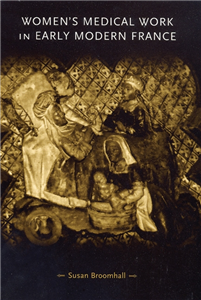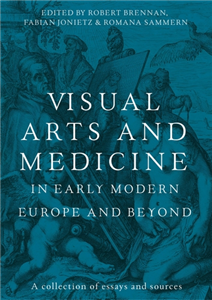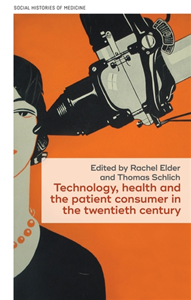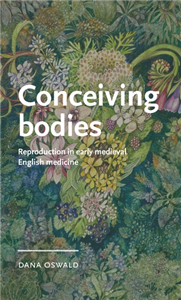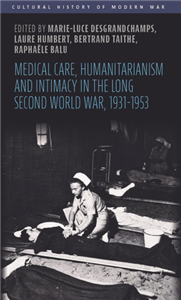Your Search Results
-
Promoted Content2019
Harmed Not Cured
Major medical and pharmaceutical scandals in Germany
by Eckart Roloff and Karin Henke-Wendt
Botched medications, malpractice, the transplant business: when doctors or pharmaceutical companies make mistakes or cross ethical boundaries, this often has serious consequences for patients. One example is thalidomide. Despite inadequate testing, the sleeping pill was marketed from 1957 to 1961, and caused a large number of pregnant women to give birth to children with severe deformities. Less well known, but no less scandalous, is the “Anti-D” affair in the former GDR, where, during 1978 and 1979, thousands of women and many children were infected with hepatitis C through contaminated immunoglobulins. This was not revealed until years later. This book presents 16 such cases – often the stuff of thrillers, but tragic at the same time. People who reach out for help, are instead deceived and harmed. All the more important are courageous and persistent patients and journalists, who have uncovered medical scandals, publicised them and taken the perpetrators to court. Without this, no-one would be learning from the mistakes.
-
Promoted Content2022
Medical Device Information for Pharmaceutical Technicians
by Founded by Friedlinde Wilson and Baldur Kohm.Edited by Dr. Anette Vasel-Biergansand Hannelore Eitel-Hirschfeld
Ranging from eyebaths and compression stockings to electronic cigarettes, the variety of medical aids available is huge. Every day, expert advice on these is needed at the pharmacy. The authors have summarised these aids in a practically oriented way. They provide background information, specifics about the materials, application descriptions, practical tips and product examples. Colourful illustrations show how they are used on or by the patient. Fully updated, the new edition of the book contains not only conventional medical devices but also those asked for at a contemporary community pharmacy. This 11th edition, which has been completely revised, contains: - definitions enabling rapid familiarisation with the topic, - tables that provide an overview, - illustrations and advice tips to help with practical use, - mnemonics and practice questions which help reinforce the knowledge Bonus: QR codes take the user to additional digital material! The ideal companion in training and on the job!
-
 Trusted Partner
History of medicineNovember 2011
Trusted Partner
History of medicineNovember 2011Women's medical work in early modern France
by Susan Broomhall
Women have long been crucial to the provision of medical services, both in the treatment of sickness and in maintaining health. In this study, Susan Broomhall situates the practices and perceptions of women's medical work in France in the context of the sixteenth century and its medical evolution and innovations. She argues that early modern understandings of medical practice and authority were highly flexible and subject to change. She furthermore examines how a focus on female practitioners, who cut across most sectors of early modern medical practice, can reveal the multifaceted phenomenon of these negotiations for authority. This new paperback edition of Women's medical work in early modern France skilfully combines detailed research with a clear presentation of the existing literature of women's medical work, making it invaluable to students of gender and medical history.
-
 Trusted Partner
The ArtsFebruary 2026
Trusted Partner
The ArtsFebruary 2026Visual arts and medicine in early modern Europe and beyond
A collection of essays and sources
by Robert Brennan, Fabian Jonietz, Romana Sammern
This book opens up new perspectives on the relationship between art, medicine, and science in late-medieval and early modern Europe. Looking beyond the traditional nexus of art, anatomy, and optics, the volume sheds light on a broader array of connections between artists and physicians: collaborations between painters and doctors on colour charts, handwork skills common to sculptors and surgeons, the transmission of art theory through medical texts long before the emergence of art writing itself as an independent genre, and the kinship of medical diagnosis with early modes of connoisseurship. Reconfiguring the histories of art, medicine, and science, the book also traverses conventional boundaries between physical and mental health, religious and medical modes of healing, menial and exalted forms of knowledge and labour, as well as vernacular and scientific understandings of human difference, including gender, race, and neurodiversity.
-
 Trusted Partner
2022
Trusted Partner
2022Drugs and Medical Devices in Nursing
Training for nurses and carers
by Dr. Constanze Schäfer
What applies when storing potatoes is also good for drugs and medical devices! But this is where the similarities end. If medicines are not stored correctly or used properly, they may not be effective. Pharmacists - the experts on medicines - explain to the nursing team: - How light, air and temperature can cause damage - Where the pitfalls lie in the use of tablets, drops etc. - What makes medical devices so different from drugs New in the 3rd edition: Improved overview of the types of use. Clearer comparison of drugs and medical devices. Video clips on the use of specific dosage forms can now be directly launched from the presentation. 36 editable PowerPoint slides, videos and a complete text of the presentation are available on CD-ROM and for download
-
 Trusted Partner
Humanities & Social SciencesJanuary 2019
Trusted Partner
Humanities & Social SciencesJanuary 2019Sickness, medical welfare and the English poor, 1750-1834
by Steven King, Keir Waddington, David Cantor
At the core of this book are three central contentions: That medical welfare became the totemic function of the Old Poor Law in its last few decades; that the poor themselves were able to negotiate this medical welfare rather than simply being subject to it; and that being doctored and institutionalised became part of the norm for the sick poor by the 1820s, in a way that had not been the case in the 1750s. Exploring the lives and medical experiences of the poor largely in their own words, Sickness, medical welfare and the English poor offers a comprehensive reinterpretation of the so-called crisis of the Old Poor Law from the later eighteenth century. The sick poor became an insistent presence in the lives of officials and parishes and the (largely positive) way that communities responded to their dire needs must cause us to rethink the role and character of the poor law.
-
 Trusted Partner
2025
Trusted Partner
2025Why Be a Christian Today?
by Elisabeth Zoll / Thomas Seiterich (eds.)
The exciting texts and reports by professing Christians offer a fresh perspective for all those who have cultivated a Christian spirituality for many years. However, the book also provides easy access for those who are newly interested in the Christian faith. There are probably as many professions of Christian faith as there are believers in the world. But what do Christians think and how have they been moulded? Elisabeth Zoll and Thomas Seiterich have compiled very personal ideas about the Christian faith in this book. When selecting the contributors, the editors deliberately chose not to include people with church offices or specialised theologians. Irrespective of church policy issues and church scandals, the contributors have provided insights into their path to faith.
-
 Trusted Partner
Trusted Partner
-
 Trusted Partner
MedicineNovember 2024
Trusted Partner
MedicineNovember 2024Technology, health and the patient consumer in the twentieth century
by Rachel Elder, Thomas Schlich
Technology and consumerism are two characteristic phenomena in the history medicine and healthcare, yet the connections between them are rarely explored by scholars. In this edited volume, the authors address this disconnect, noting the ways in which a variety of technologies have shaped patients' roles as consumers since the early twentieth century. Chapters examine key issues, such as the changing nature of patient information and choice, patients' assessment of risk and reward, and matters of patient role and of patient demand as they relate to new and changing technologies. They simultaneously investigate how differences in access to care and in outcomes across various patient groups have been influenced by the advent of new technologies and consumer-based approaches to health. The volume spans the twentieth and twenty-first centuries, spotlights an array of medical technologies and health products, and draws on examples from across the United States and United Kingdom.
-
 Trusted Partner
2021
Trusted Partner
2021Lexicon of Medicinal Plants
by Prof. Dr. Dietrich Frohne (†), in collaboration with Prof. Dr. Birgit Classen
Indian mulberry, St. John’s wort, Hawaiian baby woodrose – whether disputed wonder drug, traditional medicinal plant or unknown exotic plant – the Lexicon of Medicinal Plants can always be relied upon. The lexical and classic knowledge about the individual medicinal plants – such as family, origin, use, effect and constituents – garnered over decades and peppered with particular anecdotes on the herbal drugs, can be regarded as unique and largely timeless. At the repeated request of readers, this reference work has therefore been reissued in book form, with its contents largely unchanged but with misprints corrected and its layout modernised. A wealth of experience that even in the fast-moving digital world preserves traditional knowledge.
-
 Trusted Partner
MedicineMay 2025
Trusted Partner
MedicineMay 2025Brutal treatments
Medicine and colonial violence at the end of empire
by Russell T. Moul
Brutal treatments explores the role medical doctors played in the colonial counterinsurgency campaigns in British Kenya (1952-1960) and French Algeria (1954-1962) in the final years of empire. It not only examines how these medical professionals became embroiled in the conflict, but also how they used their knowledge to further the interests of the state. The book makes a substantial and significant contribution to the history of medicine, the history of medical ethics, and the history of colonialism.
-
 Trusted Partner
Humanities & Social SciencesMarch 2017
Trusted Partner
Humanities & Social SciencesMarch 2017Payment and philanthropy in British healthcare, 1918–48
by George Campbell Gosling, Keir Waddington
This book is available as an open access ebook under a CC-BY-NC-ND licence. At a time when payment is claiming a greater place than ever before within the NHS, this book provides the first in-depth investigation of the workings, scale and meaning of payment in British hospitals before the NHS. There were only three decades in British history when it was the norm for patients to pay the hospital; those between the end of the First World War and the establishment of the National Health Service in 1948. Payment played an important part in redefining rather than abandoning medical philanthropy, based on class divisions and the notion of financial contribution as a civic duty. With new insights on the scope of private medicine and the workings of the means test in the hospital, as well as the civic, consumer and charitable meanings associated with paying the hospital, Gosling offers a fresh perspective on healthcare before the NHS and welfare before the welfare state.
-
 Trusted Partner
Literature & Literary StudiesMay 2024
Trusted Partner
Literature & Literary StudiesMay 2024Conceiving bodies
Reproduction in early medieval English medicine
by Dana Oswald
Despite reliance on ingredients like horse dung, Old English remedies for women's medicine speak to contemporary reproductive concerns. Previous translators reduced the remedies to a general category of women's medicine, but sustained examination of language reveals important distinctions: remedies for menstruation indicate social concerns about fertility, where remedies for 'cleansing' do not provide a clear path to conception, but rather foreclose it. Rarest of all are the remedies for childbirth, but their rarity is compounded by the practices of translators who conflate the language for women's reproduction into an amorphous singularity. Through an original method of hysteric philology-the combining of traditional philology with contemporary feminist and medical epistemologies-this book situates itself in the historical treatment of reproductive people as both objects and subjects of medical practice, and gestures forward in time to the contemporary struggle for bodily autonomy.
-
 Trusted Partner
2024
Trusted Partner
2024Cannabis
A handbook for science and practice
by Dr. Andreas Ziegler
Cannabis from A to Z – now available in English The use of cannabis for medicinal purposes can be traced back to antiquity, but it is only recently that it has garnered attention as one of the most exciting medicalpharmaceutical topics. In hardly any other area of pharmacotherapy has knowledge of late developed with comparable dynamism. Experts from different fields are continuously working on new scientific evidence for the therapeutic use of cannabis and cannabinoids in order to provide patients with quality-assured cannabis medicines. For the first time, representatives of all relevant disciplines contributed to an exhaustive work on this topic, addressing medical-therapeutic aspects as well as questions on cultivation, quality assurance, supply practice, and patient care. The concentrated expertise created a unique, comprehensive picture, offering an unprecedented, consolidated scientific and legal framework of medical cannabis care. All facts have been conscientiously researched and meticulously reviewed. The result is a scientifically valid work setting new standards. For all those who deal with cannabis for professional or personal reasons, this exceptional book is indispensable.
-
 Trusted Partner
May 2021
Trusted Partner
May 2021The Humane Idea
Rudolf Virchow and Hermann von Helmholtz. The legacy of the Charité
by Ernst Peter Fischer, Detlev Ganten
Two of today’s leading scientists, Ernst Peter Fischer and Detlev Ganten, reconfirm the legacy of two influential 19th-century researchers. To mark the 200th birthday of Rudolf Virchow (1821–1902) and Hermann von Helmholtz (1821–1894), they explain why pioneering research and holistic thinking are still relevant for health science and practice, and for a sustainable balance of people, society and the environment. The historical achievement of Virchow and Helmholtz continues today with the work of researchers like Emmanuelle Charpentier and Christian Drosten, so ensuring that the humane idea continues to be fruitful in the future. An insight into the history of medical science.
-
 Trusted Partner
Trusted Partner
-
 Trusted Partner
2023
Trusted Partner
2023AMTS (Drug Therapy Safety) and Medication Analysis
Extended medication counselling for polymedication
by Stefanie Brune
Taking five or more medications – this is part of the daily routine of many, especially elderly people. But polymedication increases the risk of drug-related problems. This is where the pharmaceutical service „Extended medication counselling for polymedication“ comes in. This comprehensive guide shows how to establish and implement such knowledge in the pharmacy: ■ Part A explains the legal and contractual basis of the service. In addition, the publication highlights the risks of polymedication, drug-related problems and goals, and the benefits of the service for the stakeholders involved in the pharmacy, the doctor‘s practice, and for the patients themselves. ■ Part B is dedicated to the organisation in the pharmacy: team preparation, quality management, required documents, consulting and workplaces, and staff qualification. Aspects such as time management, patient recruitment and public liability are also considered. ■ Part C describes the individual process steps flanked by aids such as work tables, checklists, sample texts (for download at www.Online-PlusBase.de) and a comparison table for supporting AMTS software tools, including screenshots. ■ Part D offers case studies, including the initiation of extended medication counselling, the pharmaceutical AMTS review (software-supported), solution paths and communication (including formulation examples) with the various stakeholders involved. A medication analysis promotes drug therapy safety, strengthens customer loyalty and creates new opportunities for interdisciplinary cooperation with the medical profession – good reasons for starting immediately!
-
 Trusted Partner
Humanities & Social SciencesMarch 2019
Trusted Partner
Humanities & Social SciencesMarch 2019Managing diabetes, managing medicine
Chronic disease and clinical bureaucracy in post-war Britain
by Martin D. Moore, Keir Waddington, David Cantor
This book is available as an open access ebook under a CC-BY-NC-ND licence. Through its study of diabetes care in twentieth-century Britain, Managing diabetes, managing medicine offers the first historical monograph to explore how the decision-making and labour of medical professionals became subject to bureaucratic regulation and managerial oversight. Where much existing literature has cast health care management as either a political imposition or an assertion of medical control, this work positions managerial medicine as a co-constructed venture. Although driven by different motives, doctors, nurses, professional bodies, government agencies and international organisations were all integral to the creation of managerial systems, working within a context of considerable professional, political, technological, economic and cultural change.
-
 Trusted Partner
2023
Trusted Partner
2023Preventing Migraines Naturally
by Dr. C. Gaul
Migraine, a widespread disease Migraine is the second most common headache disorder in western industrialised countries. Pulsating headache attacks occur at more or less frequent intervals, usually on one side of the head. Women are up to three times more likely to be affected than men. In a quarter of patients, the disease begins in childhood and adolescence, and the onset of migraine attacks after the age of 45 is rather unusual. Most migraine attacks occur between the ages of 20 and 40. This self-help book provides migraine patients with up-todate medical and scientifically sound information on how to - be able to relieve headaches and migraines efficiently and sustainably using natural remedies, - reduce the frequency of pain attacks, and - better manage headaches and migraines with simple preventive measures. Improve your quality of life!
-
 Trusted Partner
Business, Economics & LawJuly 2025
Trusted Partner
Business, Economics & LawJuly 2025Medical care, humanitarianism and intimacy in the long Second World War, 1931-1953
by Marie-Luce Desgrandchamps, Laure Humbert, Bertrand Taithe, Raphaële Balu
This book offers a micro-global history of humanitarianism and medical care during the 'long' Second World War, which challenges the traditional and Eurocentric chronological boundaries of 1939/1945. It takes as its starting point the Japanese invasion of Manchuria in 1931, which led to the progressive dislocation of the League of Nations, with the Japanese, German and Soviet departures in the 1930s. It ends with the termination of the Korean War in 1953, and the subsequent dismantlement of the first United Coalition and UN Peace enforcement operation. It considers the slow, messy and ambivalent transformation of humanitarian actors' relations to the suffering of distant others through a study of humanitarian encounters, practices, spaces and affects. Paying close attention to a variety of actors, such as French colonial doctors, Swiss ICRC delegates, Egyptian relief workers, Chinese-style physicians, Peruvian and Ecuadorian nurses or American member of the Unitarian Service Committee, the book provides a more holistic story of humanitarianism.








